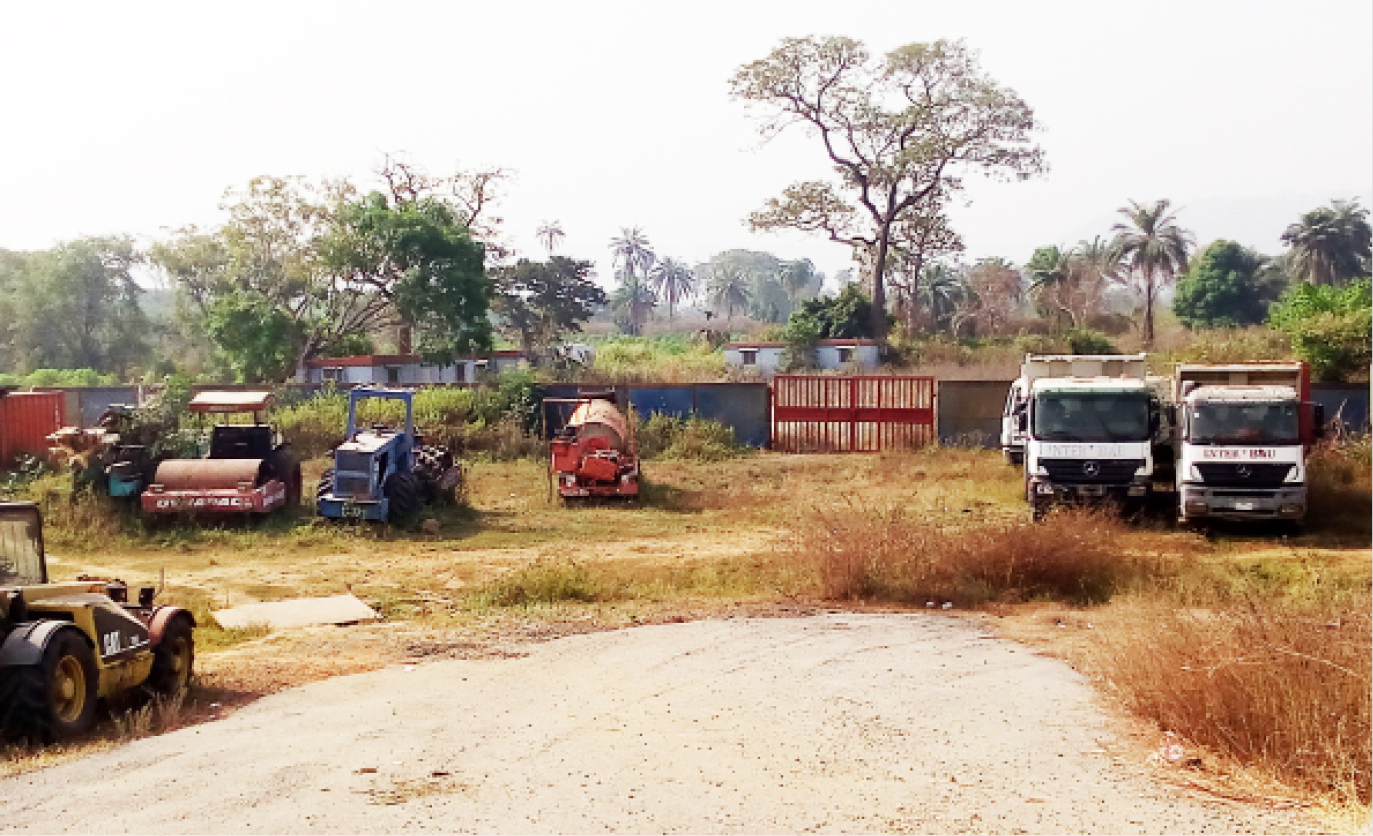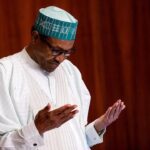The project site of the Lokoja river port in Akpanya community, along Abuja expressway, near Jamata, had remained in its desolate state. The sign of inactivity was noticeable right from the expressway, with its access way barricaded with logs and heavy stones. As one edges closer, the tell tale sign of abandonment becomes overwhelming.
The work station of the construction company handling the port project has been overtaken by weeds. The company’s heavy-duty vehicles and other machines are barely visible, except the cranes and dredgers, which tower above the inhibitors.
The structures that served as offices of the company’s managers and engineers are also in ruin. But the security section, where Malam Ishaq Musa emerged from as our correspondent approached the facility, is still intact. It is from the refurbished container that Musa and four other colleagues took turns to watch over what is left of the company’s properties.

At the sand-filled bank, three structures abandoned at different stages of completion stand, while pilling sheets meant for the embankment have taken over part of the bank.
Our correspondent observed that inactivity is somewhat giving room for encroachment, with herders’ settlements springing up around the area.
Asked what he would do if the contractor returned to site the next day, Ardo Ahmodu merely waved the question aside and retorted, “For more than five years there have been rumours of their planned return.’’
In between those periods, Ahmodu had moved in and out of the area each year, at the peak of the wet season when the river bank becomes too risky and life- threatening.
“It is all politics, never trust politicians. The project is already doomed,’’ he said.
Such outbursts are results of dampened expectations thrown up by the long neglect of the project.
The enthusiasm, which initially heralded the construction of the port for renewed economic activities, has since ebbed.
Expectedly, the delay in completing the project, years after its contract was awarded, has continued to generate concerns amongst stakeholders in the state.
Daily Trust Saturday learnt that the idea of building an inland port in Lokoja, alongside the dredging of Niger River, was first conceived by the late President Umar Musa Yar’adua over a decade ago.
It was learnt that the project was first awarded to Messers Foby Engineering Ltd at the cost of N2.3 billion in 2007 and a mobilisation fee of N800million was paid. But due to the alleged inability of the contractor to perform, the contract was revoked, revised and subsequently re-awarded in the second quarter of 2012 to another company, Inter-Bau Construction Ltd, at the cost of N4.112 billion.

The administration of former President Goodluck Jonathan, who re-awarded the contract on March 23, 2012, gave 57 weeks as the expected period for the completion of the project.
The Lokoja port was supposed to have been delivered and put to use since December 2013. But alas, seven years after the project was re-awarded, the port is yet to be completed and put to use.
Briefing journalists after the contract was re-awarded, the then minister of information, Labaran Maku, indicated that the project, when completed, would open up “full blown economic activities in line with the transformation agenda of the Federal Government.’’
“The process of evacuating agricultural produce, petroleum products, bulk cargoes and distribution of essential import items through the inland waterways will be given a boost. The Federal Government also envisages that the projects would stimulate increase in employment, while improving the socio-economic development of the area. The overall effectiveness of inland waterway transportation system will be put to test while the socio-economic activities of communities will also be enhanced,” Maku had said.
Unfortunately, however, the vision of the Federal Government in building a port in Lokoja has remained elusive.
The site has been deserted while most of the equipment and materials being used by contractors on the project site were abandoned and overgrown by tall grasses.
Our correspondent observed that the road leading to the port has been tarred and a couple of structures also erected at the project site.
A former staff of the construction company told our correspondent that work stopped on the port since 2016. According to him, many of the workers were owed a backlog of salaries before the company closed shop and abandoned the site.

Why Lokoja river port project lingers
Findings by Daily Trust Saturday revealed that over N2b had been paid to the contractor, prior to the stoppage of work at the port. The bone of contention was the alleged move by the contractor to have the contract reviewed upward by almost 100per cent of its initial cost.
It was, however, learnt that the Minister of Transportation, Rotimi Amaechi, turned down such request for upward review, describing it as ‘outrageous,’ saying the Federal Government would not subscribe to that.
Apart from the contention on the upward review of the contract, it was also learnt that the non-release of funds to the contractor when due was also part of the factors that contributed to the delay in the progress of work at the site, prior to its abandonment.
A staff of the National Inland Waterways Authority (NIWA) who spoke to our correspondent on condition of anonymity said most of the issues they had in respect of projects’ delay emanated from indigenous contractors who ought to have been patriotic in discharging their duties. He said a similar port project (Baro port), which was contracted to a Chinese firm, had since been completed and commissioned by President Muhammadu Buhari. According to him, some of the indigenous contractors deliberately employ delay tactics in project execution, only to later seek for upward review of the contract sum on grounds that the cost of materials have gone up, or they give other excuses.
All efforts to get the comments of the contractor proved abortive as several calls and text message sent to his mobile line were not responded to.
Stakeholders worry over non completion of project
At the moment, the high enthusiasm, expectations and euphoria that heralded the re-award of the contract amongst members of the host community and other critical stakeholders in Kogi State have waned.
Stakeholders are now expressing worries over the delay in the completion of the project, which they believe would boost commercial and socio-economic activities in the state.
The spokesman of the host community, Oheteh Dauda, said his people had been waiting for the completion of the port since the project began. He appealed to the NIWA to do all it could to ensure that the project becomes a reality. He said the community had received assurances from the management of the NIWA and officials from the Ministry of Transportation in the past without result as it relates to the completion of the port.
According to him, the people of the community surrendered their land for the project with the hope that it would boost economic activities in the area and provide job opportunities for them.
The paramount ruler of Lokoja, Alhaji Muhammadu Kabir Maikarfi III, also expressed worry over the delay in completing the project despite the billions of naira spent by the Federal Government.
He lamented that the stalemate in completing the project, coupled with the dormancy of the inland waterway transportation in the state, had made people of Kogi to lose job opportunities and other economic benefits.

Alhaji Maikarfi III recalled how Lokoja rose to prominence when the Europeans arrived in the 1960s and explored the use of the two waterways in West Africa as a major inland port for their companies, thus creating jobs for the youth.
The monarch, who noted that the confluence of River Niger and River Benue gave Lokoja an economic advantage, with light ships coming to berth, added that at that time, people could travel by water to Makurdi, the capital of the present day Benue State, Baro, and as far as Adamawa.
According to him, during that period, there was nothing like dredging the Niger, yet light cargoes plied the waterways with ease, bringing goods from Europe directly to Lokoja.
He believes that if water transport is revived, it would impact positively on economic activities and address security challenges in the area. He explained that it would also decongest the roads and boost government’s economic diversification agenda since more companies would go into shipping of goods, and farmers would equally expand their productivity.
Also speaking on the state of the project, a pressure group under the aegis of Lokoja Democratic Development Forum (LDDF), expressed concern and appealed to President Muhammadu Buhari to ensure its completion.
The president of the Forum, Alhaji Zubair Angulu, and the secretary, Comrade Tade Orungbami, lamented that the project, which was first awarded in 2007, was being turned into a “white elephant project” as several deadlines for its completion were never honoured.
“The Lokoja inland port and others, including Onitsha and Baro, were supposed to facilitate the movement of cargo within designated hubs and enhance socio-economic activities in the country, reduce pressure on our roads, create jobs and generate revenue for government.
“Indeed, it was celebrated as one of the infrastructural landmarks bequeathed to our state, our zone, our federal constituency and local government by the former administration. But here we are, with a project that may never see the light of day because of the attitude of the contractors,” the group stated.
NIWA gives assurance on completion
Meanwhile, the managing director of the NIWA, Chief George Muoghalu, has assured that the Lokoja river port would be completed to boost the economy of the immediate host community, state and the national in general.
Muoghalu, who gave the assurance when he paid a visit to the project site at Akpanyan community, said it was worrisome that it was yet to be completed. He, however, assured that the NIWA under his leadership would meet with relevant stakeholders to iron out all grey areas, with a view to mobilising the contractor back to site.
“I’m worried, just like anyone of you. I will assure you that we will double our efforts to ensure that the port is completed. Some levels of investments have been put in here by the government and we will not allow it to be wasted. We have need for the port here.
“We will engage the contractor, supervising authorities and consultants on the project. The most important thing for me now is what will be done to get the port completed as soon as possible,’’ he said.
He expressed optimism that everything would be done to ensure the contractor returns to site to complete the project.

 Join Daily Trust WhatsApp Community For Quick Access To News and Happenings Around You.
Join Daily Trust WhatsApp Community For Quick Access To News and Happenings Around You.


